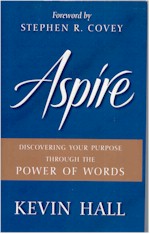 |
|
|
| ||||||
|
|
This page is the original source of this review, though you may also find it on Amazon or other sites. | ||
| Book Reviews Home | Free Audio Books | |
 |
Book Review of: AspireDiscovering Your Purpose Through The Power of Words Price:
$16.49 Availability: Usually ships
within 24 hours |
| Review
of
Aspire, by Kevin Hall (Hardcover, 2010) (You can print this review in landscape mode, if you want a hardcopy) Reviewer: Mark Lamendola, author of over 6,000 articles. This book provides an interesting way to look at how you treat others, how you view yourself, and how you set your priorities in life. The author uses eleven words, devoting a chapter to each. He uses etymology as the starting point. From the original meaning of each word, he extrapolates the value that meaning holds and provides a life lesson. In some cases, this etymology approach is a bit of a stretch. Words change their meaning over time, and many people use words without knowing what they mean. The author covers these and other would be weaknesses, making the approach workable and relevant. He's not advocating that people sit down with a dictionary to find the meaning of life, but he is advocating reflection upon these eleven words. Two of the words are very familiar: humility and integrity. We've all read ample pages and listened to ample messages on those two words. Even so, Hall manages to squeeze out something new (at least it was new to me). Other words aren't so familiar. These include Namaste (the e is accented) and Ollin.
I put the book down after the very first chapter. Not because I didn't want to read further, but because I just wanted to reflect on that chapter. Chapter One is titled "The Secret Word," so in this review I won't reveal it (or it wouldn't be a secret). But its meaning and application have to do with not making others small. I seldom intend to belittle others, but sometimes do so when I have the opposite intention. Some ideas in this chapter may help me with that. Each chapter concludes with two items: 1. "My Journal Thoughts On...." which is apparently from Hall's own journal. He reflects on the meaning for him personally. 2. An exercise for the reader. In Chapter Three, we meet Arthur, a Master of Words (as does Kevin, who describes his first meeting with this amazing man in this chapter). From there forward, each chapter includes material or insights from Arthur on that particular word. Stephen R. Covey wrote the Foreword. Dr. Gerald Bell wrote the AfterWord. Bell's contribution is deeper than this, however, and you understand that when you read how he and Hall met. It was the craziest of coincidences. Or was it a coincidence? Read the book and decide. | |
About these reviewsYou may be wondering why the reviews here are any different from the hundreds of "reviews" posted online. Notice the quotation marks? I've been reviewing books for sites like Amazon for many years now, and it dismays me that Amazon found it necessary to post a minimum word count for reviews. It further dismays me that it's only 20 words. If that's all you have to say about a book, why bother? And why waste everyone else's time with such drivel? As a reader of such reviews, I feel like I am being told that I do not matter. The flippancy of people who write these terse "reviews" is insulting to the authors also, I would suspect. This sound bite blathering taking the place of any actual communication is increasingly a problem in our mindless, blog-posting Webosphere. Sadly, Google rewards such pointlessness as "content" so we just get more if this inanity. My reviews, contrary to current (non) standards, actually tell you about the book. I always got an "A" on a book review I did as a kid (that's how I remember it anyhow, and it's my story so I'm sticking to it). A book review contains certain elements and has a logical structure. It informs the reader about the book. A book review may also tell the reader whether the reviewer liked it, but revealing a reviewer's personal taste is not necessary for an informative book review. About your reviewer
About reading styleNo, I do not "speed read" through these. That said, I do read at a fast rate. But, in contrast to speed reading, I read everything when I read a book for review. Speed reading is a specialized type of reading that requires skipping text as you go. Using this technique, I've been able to consistently "max out" a speed reading machine at 2080 words per minute with 80% comprehension. This method is great if you are out to show how fast you can read. But I didn't use it in graduate school and I don't use it now. I think it takes the joy out of reading, and that pleasure is a big part of why I read. |
| |||||